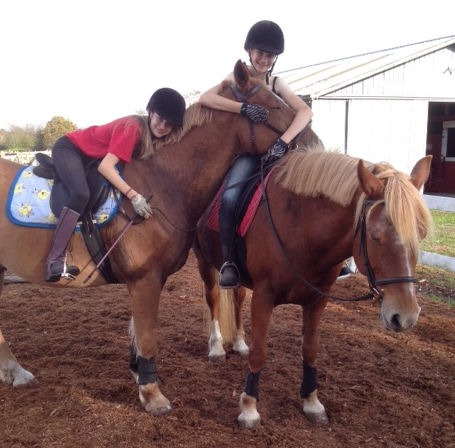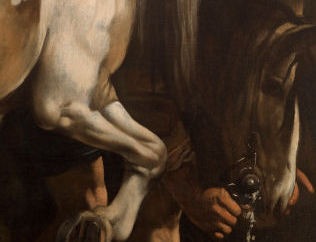Horsemanship Level 3: When to Call the Vet
No matter how well your look after your horses the inevitable day will come when you encounter an accident or illness that requires a vet call. For Horsemanship Level 3 we want you to know:
10. When to call the vet; types of wounds and treatment
Again, this is a large topic that I'll break into two posts; we'll look at treating wounds next week. Knowing when to call the veterinarian is something you will get better at the longer you spend time with horses. However, the best rule of thumb is: if you're not sure, phone. If you've developed a good relationship with your vet she won't mind your phone call, no matter the time of day, and your conversation will often determine whether or not she needs to make a farm call immediately or wait till the next day. The following are some cases in which you should call right away, and these will probably require an immediate visit.
Colic
Colic is a catch-all term for gut pain and has many causes, including constipation, excess gas, massive parasite load, displaced gut, and enteroliths (large stones formed in the gut from ingested sand). Since some of these are life-threatening and it is difficult to tell the cause at first glance, all suspected cases of colic warrant a phone call and will likely result in a farm visit.
Symptoms can include restlessness, kicking or biting the sides and belly, sweating, frequent lying down or rolling and elevated vital signs (TPR), but may also be a subtle as listlessness and lack of appetite.
What to do while you wait: since most vets have an answering service, you will have some time while you wait for her to call you back. If it is possible and safe (ie, the horse is not rolling or collapsing) take the horse's TPR and make note of all the symptoms. Check his gums and if possible listen for gut sounds. Make note of the number and quality of droppings in his paddock and whether he seems to have been passing urine normally. This information will help the vet determine the urgency of the situation. It's not necessary to keep the horse from lying down or rolling, and it can be dangerous to try and do so. Hand walking helps calm the owner, may distract a horse in mild pain, and can ease gas colic or constipation, but will not help a horse with severe colic.
Azoturia (Tying Up)
Tying up is a condition of severe cramping of the large muscles, often the hindquarters. It is thought to be caused by a carbohydrate-rich diet and electrolyte imbalance. It is usually triggered by exercise following a period of rest, and some breeds are more susceptible than others.
It's sometimes hard to tell azoturia from colic as the horse may have similarly high TPR rates as well as patchy sweat. However, a horse that's tied-up will usually have a group of extremely hard, contracted muscles and be very stiff and hard to move. The urine may also be darker than normal.
What to do while you wait: if the condition occurs when you're riding, dismount, loosen the girth, and cover the hindquarters to keep them warm. Offer the horse some water if possible. Once the initial emergency is past the vet will probably offer some feeding and exercise suggestions to prevent recurrence.
Breathing Difficulty 
If your horse has any difficulty breathing it is an emergency. The most common cause is a sudden attack of chronic obstructive pulmonary disease (COPD or heaves). As the name implies, this is a chronic disease which develops over time. However, like humans with asthma, a sudden acute attack can be life-threatening.
Coughing, wheezing, heaving flanks and standing with the neck stretched out are all symptoms of respiratory distress.
What to do while you wait: If your horse is indoors take him outside away from any hay, bedding, or arena dust. After medication has eased the emergency, stabling or feed may need to be changed to avoid triggers.
Choke
Choke is a blockage of the oesophagus, usually caused by bolting hard dry food such as unsoaked beet pulp or dry hay cubes.
Symptoms include drooling or foaming at the mouth or nostrils, sometimes with bits of food coming out the nose. The horse is distressed and unable to swallow. A lump of food may create a bulge in the throat -- avoid pressing on this as it's easy to damage the oesophagus.
What to do while you wait: Remove any food from the stall or paddock. The horse may spontaneously clear the blockage while you wait, but a vet exam is a good idea as food particles may get into the trachea and lungs, setting up the horse for pneumonia.
Tetanus
Any wound on an unvaccinated horse calls for an emergency tetanus shot. Tetanus is almost always lethal, even with aggressive treatment, but swift action can sometimes save a horse. Yearly preventative vaccination is better than any after-the-fact treatment. If your horse is wounded and it's been more than nine months since his last tetanus shot, another shot is recommended, just in case.
Signs of tetanus are a stiff horse that is reluctant to move. He may be oversensitive to sound, stand 'camped out' with his legs stretched behind him and have difficulty relaxing his head and ears.
What to do while you wait: Keep the horse in a darkened stall if possible, and reduce any excess noise. Another calm horse in a facing stall will help keep him calm until the vet gets there.
Severe Lameness
Most lameness is not an emergency. However, if the horse is unable to move or put any weight on the leg, or is in distress, call the vet immediately. Fractures, tendon sheath injuries and acute infections are all possibilities in an extremely lame horse.
What to do while you wait: Keep the horse calm and still and do not move him, or at the very least move him as short a distance as possible. Giving him scratches behind the ears or grooming him away from the affected leg may calm and comfort him while you wait for the vet.
Laminitis (Founder)
Laminitis is an inflammation of the lining of the hoof wall. It is most often caused by sudden access to too much rich food, although other causes include infections or overwork on hard ground. Ponies and 'easy keepers' tend to be more susceptible than other breeds. Laminitis is an emergency since unchecked inflammation can cause the coffin bone in the foot to rotate and drop, or sometimes even puncture the sole of the hoof, permanently affecting the horse's soundness.
Symptoms include heat in all four hooves, often with an increased digital pulse. The horse often stands leaning backward, with the weight on his heels in a 'sawhorse' stance. He will be unwilling to move and may want to lie down.
What to do while you wait: Remove the horse from any pasture and take away all feed except water and a small amount of dry hay. Do not otherwise force him to move, and don't hose his feet. The vet may suggest a dose of phenylbutazone (bute) while you wait, but only give it on the veterinarian's orders. If she can be there quickly she may want to start treatment with injected anti-inflammatories instead.
Wounds
Wounds that need immediate veterinary care include:
- Arterial wounds, characterized by spurting blood.
- Puncture wounds or deep wounds to the foot.
- Wounds on the joints or tendon sheaths, characterized by yellow synovial fluid
- Wounds to the eye
Next week we will look at how to treat the above wounds until the vet arrives, as well as how to deal with non-emergency wounds.
Upcoming Classes
The last Cavaliere Class before we break for winter is December 14th. Mounted Combat and Cavaliere Classes will resume in February, although private classes are still available throughout the winter.
Cavaliere Class
Sunday 14 December 2014, 1pm – 4:30pm
Cost: $60 or one flex-pack credit per class
Riding and horsemanship assessments will be held at this class. If you'd like to assess, please contact Jen beforehand to confirm. Because it's the last class before the holidays we'll have a bit of horsey fun in place of regular sword drills.
Intro to Mounted Combat
Sunday 1 February 2015, 10am - 1pm
Mounted Combat Workshop
Sunday 1 February 2015, 1pm - 4pm
Lease Special
 Need more practice time in the saddle? We have a winter special for Academie Duello students only during the months of November, December and January. Lease one of our school horses for one day per week for a cost of only $115 per month (saving $20 per month over regular rates), or $300 for the whole three month period — a savings of $105!
Need more practice time in the saddle? We have a winter special for Academie Duello students only during the months of November, December and January. Lease one of our school horses for one day per week for a cost of only $115 per month (saving $20 per month over regular rates), or $300 for the whole three month period — a savings of $105!
Leases include one free lesson per month, and additional lessons can be booked for $35 each. You must have Riding and Horsemanship level 1 or the equivalent to qualify for a lease. Flex-pack credits may be applied to the lease. Contact Jen at jennifer(at)academieduello.com for more information.
